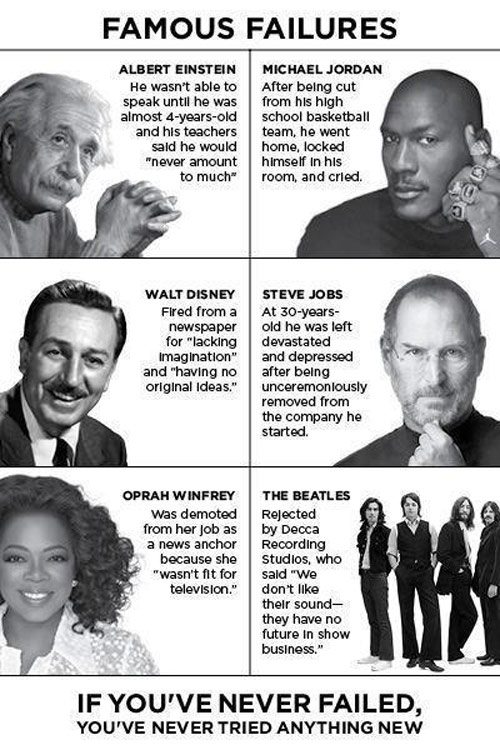
Read on as we break down the fundamental reasons why failure should be important to you.
Welcoming Failure
“Eventually, we all must come to a decision, for ourselves, about what represents failure; however, the world is very keen to put failure on a schedule, and give you a set of decisive factors, if you allow it. A meager seven-years following my graduation, failure had hit me on a grand scale. A fleeting marriage was dissolved, I had no job, a single parent, and as destitute as anyone could possibly be without living on the streets. My parent’s fears for me, and those I had for myself, had finally transpired, and according to the book of failure, I was the biggest.” This paragraph is a summation of a speech given by J.K. Rowling at the, AMHAA, the Annual Meeting of the Harvard Alumni Association. If any of you are not familiar with the name J.K. Rowling, she is the creator of Harry Potter. A fable filled with unbelievable characters and imaginary. Yet, at one time, she had considered herself a failure.The premise of using J.K. Rowling as an example about the importance of failure is to emphasize the point that, failure is not unusual. Being an author worth billions of dollars is not a prerequisite in order to learn from our failures and to attain success. Success means something different to different people. However, there is something everyone has in common who has succeeded at what they set out to do; they have failed at one time or another. In fact multiple times. Henry Ford, the great automaker, went bankrupt four times. Google tried to sell itself for one million dollars! Thomas Edison produced thousands of light bulbs that gave no light at all!
Failure is a type of freedom. Why? Because the worst has happened. Now, you can relax and rebuild your life. You do not have to fail on a large scale, but failure in life is inevitable. There is no way to live life without failing from time to time. The only way you won’t fail is if you live so guardedly that you are barely living at all, wherein, you fail by default. A wise thinker once stated, “Avoiding danger is no safer in the long run than out-and-out exposure, and the fearful are captured just as frequently as the bold.” Failure is not something to shun, but something to embrace.
The Importance of Failure
Okay, it’s clear; we all will face failures in life. However, this does not mean we should “chase failure” in order to get it over with, so to speak. It’s a funny thing, but failure is never planned. It’s the companion of success. An unwanted companion for sure, but nevertheless, a very important one.When we resist failure, it attaches itself to us. You don’t solve an issue by resisting it. We overcome failure by accepting it, analyzing it, dissecting it, and looking at it from every possible angle. Without failure, there is no growth.
The Business of Failure
The United States, SBA, Small Business Administration, states that more than half of small businesses fail during the initial five years in service. However, failed entrepreneurial pursuits are as vital as successful ones. One trade that thrives on failure is the technology industry. There’s hardly anyone over the age of 25 who is not familiar with the late Steve Jobs, the founder of Apple Computers. He was the perfect example of courage in failure. In his first attempt at a mobile gadget, it failed. In fact, it failed pretty badly and he was thrown out of the company. Nonetheless, he is one of the greatest comeback stories of all time.”Unfortunately, failure in entrepreneurial activity is frowned upon. During Steve Job’s attempts at success in the 70s, failure was par for the course. Markets are certainly sought-after not because they are “failure proof.” It’s because they offer a procedure for gaining from mistakes along with the inducement to correct them. Entrepreneurs have to be crafty. They are not only good at getting things right, they, like the rest of us, can understand when they have it wrong and work on correcting their mistakes.
The More You Fail, the More You Win
Failure drives us to change. Without it, where would we be today? Thomas Edison produced tons of light bulbs that did not work. If he had not tried again and again, well, we all know the answer to that one. Winston Churchill once stated, “Success is based on going from failure to failure without losing eagerness.” Of course, some individuals are sardonic. These types of people never pick themselves up from failure because they did not grow from a previous failure. Failure is the most wonderful teacher if we are willing to learn from it.Success does not come easy. Everyone must face one hurdle after another. It’s the only way to reach success. The reason being is that success must be maintained. If you think that once you have the success you crave and it’s time to relax, you are sadly mistaken. For example, you’ve always wanted to buy a home. You finally purchase the home of your dreams. However, your home must be maintained. Once a goal is reached, you must have the tenacity to remain there and move higher if you wish. Without repeated failures, you do not have the know-how of sustainability.
Even though success is the power that hastens us en route to our goals, it is failure that guides us to those goals that count. When failure is acknowledged as being just as vital as success, it’s easier to accept it freely and carry on with searching for a resolution.
Plan B
A very well known fellow stated, “the most successful people are those who are good at Plan B.” Individuals who are good at “brushing failure off their shoulders” take the necessary steps to try again, usually with Plan B. In fact, Plan B may not even be a plan at all! Plan B is the “I can do it attitude.” Plan B, is the transition from failure to success. We can comprehend the function for failure if we acknowledge that human beings prefer to “dispel the uneasiness of failure.” Human beings are forever determined to achieve their loftiest goals as frequently as time permits. However, failure surrounds us and no person ever experiences a total lack of uneasiness. There is always that smidgen of the unknown. Regardless of our best efforts, we are never 100% sure of success! There is always that lingering doubt in the back of our minds; in spite of this, our will is stronger than failure and doubt inevitably loses.“The desire to succeed, must be great than the fear of failure.” This statement was made by well-known actor and comedian Bill Cosby. In our personal and professional lives, the aforementioned quote states the significance of failure and how big a part it plays in each of our lives. Consider this. During the day, where is your energy focused? Is it focused on succeeding or failing? Is the glass half-empty or half full? Our thoughts have us on leash. Eventually, we go where they lead.
If you focus on negativity, then your world become cynical. If you focus on positivism, even the harshest defeat is only a stepping-stone. A mother was speaking with her daughter who was despondent about repeated failures. She spoke about well-known personalities and how they succeeded because they “tried that one last time.” This gave her daughter the incentive to try again. After reading about the importance of failure she stated, “you never know what waits beyond failure; therefore, I will try again.” Failure is the stratagem that leads to success. Without it, where would we be?
Here are some examples of those who failed before reaching amazing success:



































No comments:
Post a Comment